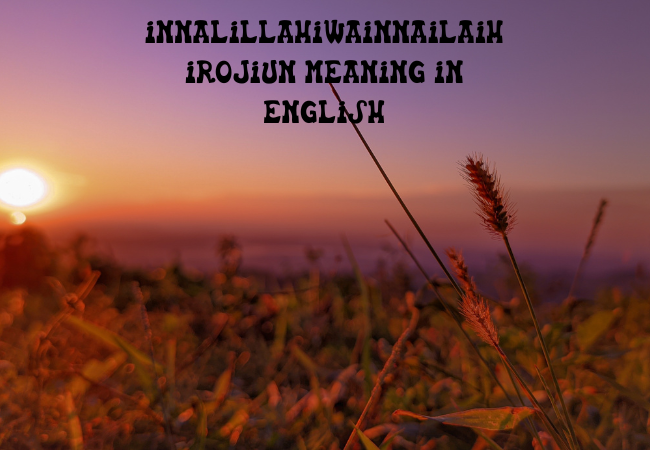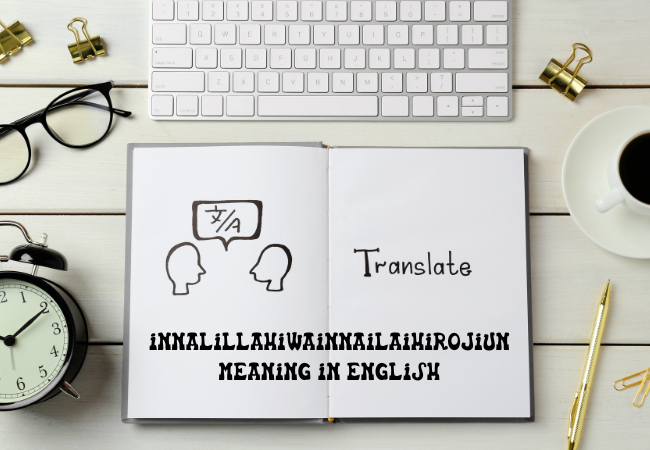Life is a tapestry woven with threads of joy and sorrow, and in our moments of grief, certain phrases offer solace and a deeper connection to our faith. One such profound phrase in Islam is “Innalillahiwainnailaihirojiun.” This phrase, often whispered in times of loss, carries a depth of meaning that transcends its mere words. Let’s embark on a journey to unravel its significance, understand its context, and explore its impact on the human spirit.
Breaking Down the Phrase
“Inna” – The Beginning
innalillahiwainnailaihirojiun meaning in english marking the beginning of a profound declaration. It sets the tone, preparing the heart and mind for a statement of undeniable truth. This word, though simple, carries the weight of certainty and affirmation.
“Lillahi” – Belonging to Allah
innalillahiwainnailaihirojiun meaning in english belonging to Allah.” This part of the phrase emphasizes the belief that everything in existence is under the dominion and ownership of Allah. It reminds us of our place in the grand scheme of life, under the care and control of a higher power.
“Wa inna ilaihi” – And We to Him
The words “wa inna ilaihi” translate to “and indeed, to Him.” This portion of the phrase acknowledges our journey through life and our eventual return to Allah. It signifies the transient nature of our earthly existence and our ultimate reunion with our Creator.
“Raji’un” – Will Return
innalillahiwainnailaihirojiun meaning in english.” This word completes the cycle, affirming the inevitable return to Allah after our sojourn on earth. It’s a powerful reminder of life’s impermanence and the eternal existence that follows.

The Context of the Phrase
This phrase is often recited upon hearing news of a death or significant loss. It’s a way of expressing condolences and a reminder of the transient nature of life. Beyond its use in moments of grief, it serves as a spiritual anchor, grounding believers in the reality of life and death.
Linguistic Analysis
The Arabic roots of “Innalillahiwainnailaihirojiun” are rich and complex. Each word is carefully chosen, contributing to a phrase that carries deep theological and emotional weight. Translating it to English doesn’t capture the full essence but provides a glimpse into its profound meaning.
The Spiritual Perspective
In Islam, acknowledging life and death as part of a divine plan is fundamental. This phrase encapsulates the journey of the soul, from creation, through earthly life, and back to the Creator. It’s a testament to the belief in a higher purpose and the eternal nature of the soul.
Cultural Implications
The phrase “Innalillahiwainnailaihirojiun” is woven into the fabric of Islamic culture. It’s used in everyday conversations, signifying empathy and shared grief. Its usage extends beyond personal loss, often cited in response to any calamity, reminding believers of the transient nature of all things.
Philosophical Insights
Philosophically, this phrase speaks to the concepts of impermanence and mortality. It teaches acceptance and surrender to the divine will, encouraging a mindset that embraces life’s inevitable changes with grace and faith.
Historical Context
The origins of “Innalillahiwainnailaihirojiun” can be traced back to the Quran, specifically in Surah Al-Baqarah (2:156). This verse emphasizes patience and faith in the face of adversity. Over time, its use has evolved, becoming a cornerstone of Islamic expressions of condolence and reflection.
Psychological Benefits
Reciting “Innalillahiwainnailaihirojiun” offers psychological comfort, providing a framework for coping with grief. It helps individuals find solace in their faith, offering a sense of peace and acceptance during challenging times.
Comparative Religion View
Similar phrases exist in other religions, reflecting universal themes of returning to a higher power. Christianity, Hinduism, and Buddhism, for instance, have their own expressions of the belief in life after death and the return to a divine source.
How to Use the Phrase Respectfully
Using “Innalillahiwainnailaihirojiun” requires sensitivity and respect. It’s appropriate in contexts of loss and calamity, and it’s important to understand its weight and significance to avoid misuse. Respectful usage fosters empathy and shared humanity.

Personal Reflections
Many individuals have shared how “Innalillahiwainnailaihirojiun” has impacted their lives. Personal stories and testimonies highlight its role in providing comfort and perspective during times of loss, illustrating its profound emotional and spiritual impact.
In Literature and Media
This phrase has been depicted in various forms of literature, movies, and songs. Its presence in artistic expressions underscores its universal appeal and its ability to convey deep emotions and philosophical insights.
FAQs
- What does “Innalillahiwainnailaihirojiun” mean?
- It means “Indeed, to Allah we belong and to Him we shall return,” emphasizing the transient nature of life and the belief in returning to the Creator.
- When is it appropriate to use this phrase?
- It is used upon hearing news of death or significant loss, offering condolences and reflecting on the impermanence of life.
- Is there an equivalent phrase in other religions?
- Yes, many religions have similar phrases reflecting the belief in a higher power and the return to a divine source after death.
- How does this phrase help in coping with grief?
- It provides psychological comfort and spiritual solace, reminding individuals of their faith and the divine plan, helping them accept and cope with their loss.
- Can non-Muslims use this phrase?
- While it is rooted in Islamic tradition, its respectful use by non-Muslims, especially when offering condolences, can be seen as a gesture of empathy and shared humanity.
Conclusion
“Innalillahiwainnailaihirojiun” is more than just a phrase; it’s a profound declaration of faith, a reminder of life’s impermanence, and a source of comfort in times of grief. Understanding its meaning and context allows us to appreciate its depth and significance, fostering empathy and respect in our interactions. In moments of loss, this phrase connects us to a higher truth, offering solace and strength.


